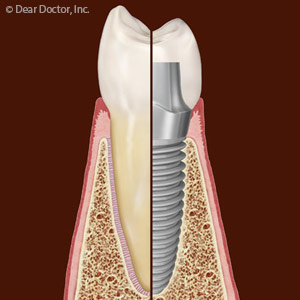Dental implants have become the standard for long-term tooth replacement. From mechanics to movie stars, people from all walks of life have discovered the advantages of replacing a missing tooth with an implant. Restoring your smile is a definite advantage, but an implant can also help maintain the health of your jawbone and adjacent teeth.
The implant is a small, screw-like titanium post that is placed into your jawbone to function as the root part of the tooth. The living bone tissue will actually attach to the titanium post, fusing them together. This will not only provide a sturdy anchor for a natural-looking dental crown but will provide stability for bridgework or dentures. You will then be able to smile, chew and talk as if all of your teeth are natural. The procedure will also help to stabilize the bone, reducing long-term bone loss that occurs when a missing tooth is not replaced.
At this point, if you think there must be a lot of pain involved, I have good news for you. Very little pain is involved after the procedure is completed, and there is no pain at all. Typically, it is a routine surgery that takes place in a dentist’s office under local anesthesia, where the immediate area is numbed. If there is any apprehension about the procedure, we will offer alternative anesthesia or sedation options during the planning process.
To determine who will be a good candidate for the implant procedure, a plan must be in place to assure the success of the implant. Part of the plan includes:
- Reviewing your past medical and dental history. We must know your complete past and present medical history, and medication use since good health is essential. Some certain conditions and diseases can affect the healing of an implant.
- Performing a comprehensive dental examination. An evaluation of your dental problems and needs will determine if implants are in your best interests. An assessment of the health and mass of the jawbone and the number and location of the implant(s) needed to restore your bite and smile back to health will also be determined.
When the dental implant procedure has been successfully completed, there is one more step. As with your natural teeth, preventive maintenance is crucial for long-term success. A daily routine of brushing and flossing, along with regular professional dental cleanings and checkups, will help ensure your implants’ continued gum health and proper functioning.
If you are wondering whether dental implants are right for you, contact us for more information or schedule an appointment for a consultation. You can also learn more about dental implants by reading the Dear Doctor magazine articles “Dental Implants” and “Dental Implant Surgery.”

